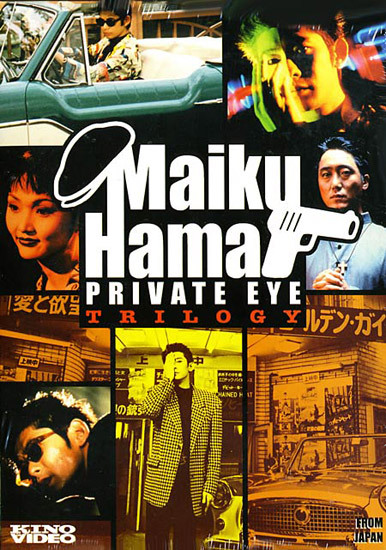Named after the Mike Hammer character created by writer Mickey Spillane, Maiku Hama (played by Masatoshi Nagase) is a private detective who's both comic and strangely cool, with unfashionable shirts and a beautiful yet malfunctioning American sportscar. He has connections all throughout Yokohama, though not all of them are happy to see him, and his office is located inside a movie theater - where the stingy owner demands you buy a ticket before entry.
This trilogy is a pastiche of numerous film tropes and references. It's often described as a parody and homage to American gangster pulp, French New Wave, and Japanese yakuza movies. However, the trilogy forms an experience totally its own. Consisting of the films The Most Terrible Time In My Life (Waga jinsei saiaku no toki), Stairway to the Distant Past (Harukana jidai no kaidan o), and The Trap (Wana), it's a bizarre combination of quirky humor and dark detective drama. It also has a catchy jazz theme song..
The character, played by Nagase, was renamed Mike Yokohama in the somewhat-connected follow-ups Mike Yokohama: A Forest with No Name (directed by Shinji Aoyama) and the TV series Shiritsu Tantei Hama Maiku.
Though all three movies were directed by Kaizo Hayashi, each film has a strikingly different tone. The Most Terrible Time In My Life is shot entirely in black-and-white Cinemascope, and starts off as an offbeat comedy about a rough-edged good guy detective with an amazing streak of bad luck. A case brought by a Taiwanese waiter brings both budding friendship and the unwelcome attention of the New Japs, a gang formed by immigrant Chinese and Koreans. The movie segues into a noir-soaked tale of loyalty, and it surprised me by exploring the subject of immigrants trying to make a living amidst prejudice in Japan. The introduction of a femme fatale into the story is initially jarring, but during the last act I found myself riveted by what was happening onscreen.
The second film, Stairway to the Distant Past, is shot in color Cinemascope. It begins with the same light tone that introduced its predecessor. Then enters the stripper Lily (Haruko Wanibuchi), the mother who abandoned Maiku Hama and his sister. At the same time, Hama finds himself drawn into the escalating political and criminal conflicts over control of Yokohama's port interests. The use of color seems to usher in a sensibility that's both more romantic and more jaded than that of the first movie. Things aren't just black and white and grey; they're complicated across the spectrum. While the violence in the first movie was made up of brutal close-range attacks, this second film goes all-out into action territory, complete with multi-level gunfights and a high-speed chase down the waterfront. Don't let this dissuade you story-minded viewers - Stairway to the Distant Past is indeed bigger in scope than the first film, but it's also more personal, dealing with Hama's own family and memories instead of those of his client. There's also a haunting scene, set amidst mannequins in a deserted alley, that serves as a taste of the movie to follow.
The Trap is my favorite entry in the Maiku Hama trilogy. Just as Maiku seems to have finally found good luck in life -business going well, wonderful girlfriend, sister doing alright- a mysterious new case brings the series into the realm of psychological thriller. Four young women are dead, looking like department store mannequins with frozen expressions and no signs of harm. The police are baffled, and as Maiku investigates the case, he finds himself considered a possible suspect in the crime.
While there are some odd bits in this installment (for example, a major gangster boss villain in the past two films is suddenly a helpful Catholic priest in this one, with no explanation), the movie maintains a high level of suspense and terror that made me forgive minor faults. This film's plunge into horror reminded me of Takashi Miike's works in that genre, but what transpires here is a breathtaking and twisted creation all its own. With a clever use of parallels and one of the scariest killers I've seen on film, The Trap is a fantastic end to the Maiku Hama trilogy.
ETA: The Yokohama Nichigeki theater featured in the movies was closed in 2005.
- - -
This post was done for the Japanese Cinema Blogathon, created to aid relief efforts for those affected by the recent earthquake and tsunami that hit Eastern Japan.
 |
| The donation page is here. More participating blogs here. |








No comments:
Post a Comment